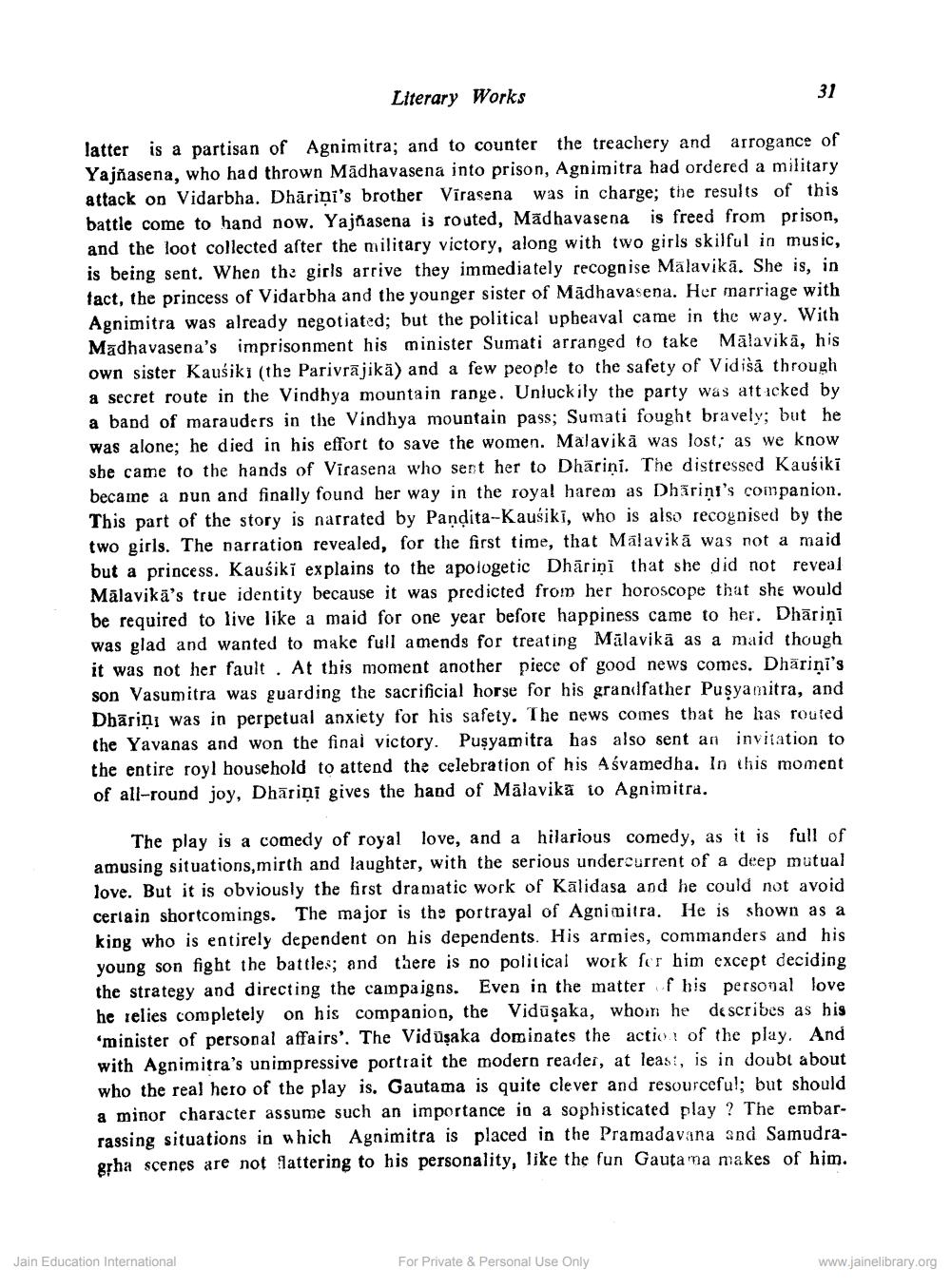________________
Literary Works
latter is a partisan of Agnimitra; and to counter the treachery and arrogance of Yajñasena, who had thrown Mādhavasena into prison, Agnimitra had ordered a military attack on Vidarbha. Dhāriņi's brother Virasena was in charge; the results of this battle come to hand now. Yajnasena is routed, Madhavasena is freed from prison, and the loot collected after the military victory, along with two girls skilful in music, is being sent. When the girls arrive they immediately recognise Mälavikā. She is, in tact, the princess of Vidarbha and the younger sister of Madhavasena. Her marriage with Agnimitra was already negotiated; but the political upheaval came in the way. With Madhavasena's imprisonment his minister Sumati arranged to take Mālavikā, his own sister Kausiki (the Parivrājikā) and a few people to the safety of Vidiša through a secret route in the Vindhya mountain range. Unluckily the party was attacked by a band of marauders in the Vindhya mountain pass; Sumati fought bravely; but he was alone; he died in his effort to save the women. Malavikā was lost; as we know she came to the hands of Virasena who sert her to Dhāriņi. The distressed Kausiki became a nun and finally found her way in the royal harem as Dhärini's companion. This part of the story is narrated by Pandita-Kausiki, who is also recognised by the two girls. The narration revealed, for the first time, that Malavikā was not a maid but a princess. Kausiki explains to the apologetic Dhāriņi that she did not reveal Mālavikā's true identity because it was predicted from her horoscope that she would be required to live like a maid for one year before happiness came to her. Dhāriņi was glad and wanted to make full amends for treating Mālavikā as a maid though it was not her fault . At this moment another piece of good news comes. Dhāriņi's son Vasumitra was guarding the sacrificial horse for his grandfather Puşyamitra, and Dhāriņi was in perpetual anxiety for his safety. The news comes that he has routed the Yavanas and won the final victory. Puşyamitra has also sent an invitation to the entire royl household to attend the celebration of his Aśvamedha. In this moment of all-round joy, Dhāriņi gives the hand of Mālavikā io Agnimitra.
The play is a comedy of royal love, and a hilarious comedy, as it is full of amusing situations,mirth and laughter, with the serious undercurrent of a deep mutual love. But it is obviously the first dramatic work of Kālidasa and he could not avoid certain shortcomings. The major is the portrayal of Agnimitra. He is shown as a king who is entirely dependent on his dependents. His armies, commanders and his young son fight the battles; and there is no political work for him except deciding the strategy and directing the campaigns. Even in the matter f his personal love he relies completely on his companion, the Vidūsaka, whom he describes as his *minister of personal affairs'. The Vidüşaka dominates the active of the play. And with Agnimitra's unimpressive portrait the modern reader, at least, is in doubt about who the real hero of the play is. Gautama is quite clever and resourceful; but should a minor character assume such an importance in a sophisticated play? The embarrassing situations in which Agnimitra is placed in the Pramadavana and Samudragrha scenes are not lattering to his personality, like the fun Gautama makes of him.
Jain Education International
For Private & Personal Use Only
www.jainelibrary.org




